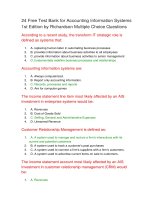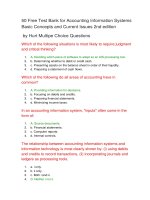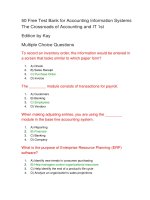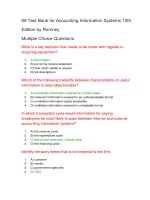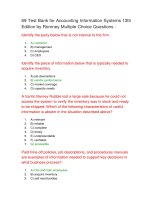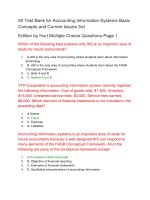122 test bank for accounting information systems 10th edition
Bạn đang xem bản rút gọn của tài liệu. Xem và tải ngay bản đầy đủ của tài liệu tại đây (144.23 KB, 32 trang )
122 Test Bank for Accounting Information Systems 10th
Edition
True - False Questions
Information has understandability when it is capable of making a difference in
a decision-making situation..
1.
True
2.
False
The Sarbanes Oxley Act of 2002 applies to publicly traded companies and notfor-profit entities.
1.
True
2.
False
As a user of an AIS an accountant may be called upon to participate in the AIS
design process.
1.
True
2.
False
Production and personnel are part of the operations process.
1.
True
2.
False
The most important information for tactical management involves information
about the organization's environment.
1.
True
2.
False
Enterprise systems integrate an organization's business processes and
information from all of an organization's functional areas.
1.
True
2.
False
The Sarbanes-Oxley Act of 2002 has dramatically changed the daily work of
financial accountants and auditors.
1.
True
2.
False
Sarbanes-Oxley Section 404 compliance is a major line of business for the
biggest accounting firms.
1.
True
2.
False
Operations management requires information that is more accurate and timely
than strategic management.
1.
True
2.
False
Billing/accounts receivable is traditionally part of the AIS.
1.
True
2.
False
Information about a customer's credit history that is received after the
decision to grant additional credit lacks completeness.
1.
True
2.
False
According to the Sarbanes-Oxley Act's Section 409, material changes in the
organization's financial condition must be disclosed to the public on a rapid
and current basis.
1.
True
2.
False
The management process includes marketing and sales.
1.
True
2.
False
It is critical for accountants to understand enterprise resource planning (ERP)
systems.
1.
True
2.
False
The MIS is a subsystem of the AIS.
1.
True
2.
False
The role of the accountant has evolved to include non-financial information
and information technology.
1.
True
2.
False
According to the Sarbanes-Oxley Act of 2002, management must identify,
document, and evaluate significant internal controls.
1.
True
2.
False
As a designer of an AIS the accountant will test a new system's controls.
1.
True
2.
False
Accuracy is the correspondence or agreement between the information and
the actual events or objects that the information represents.
1.
True
2.
False
E-business is the application of electronic networks to undertake business
processes among the functional areas in an organization.
1.
True
2.
False
The Sarbanes-Oxley Act's Section 404 creates changes in both how
companies document and evaluate internal control and how auditors audit
and report on internal control.
1.
True
2.
False
Deciding how much credit to grant to a customer is a structured decision.
1.
True
2.
False
An information system consists of an integrated set of computer-based and
manual components established to provide information to users.
1.
True
2.
False
What controls will be necessary is a question that an accountant answers in
the design of the AIS.
1.
True
2.
False
The three themes of the text are operating systems, e-business, and internal
control.
1.
True
2.
False
Information that is capable of making a difference in a decision-making
situation, by reducing uncertainty or increasing knowledge for that particular
decision, has the quality of relevance.
1.
True
2.
False
Historically the purpose of an accounting information system is to collect,
process, and report financial aspects of business events.
1.
True
2.
False
The three steps in decision making take place in the sequence of (1)
intelligence (2) design (3) choice.
1.
True
2.
False
The consistency principle is violated when a firm uses straight-line
depreciation one year and changes to declining balance depreciation the next
year.
1.
True
2.
False
According to the Sarbanes-Oxley Act of 2002 and PCAOB Auditing Standard
No. 5, management must audit and report on auditors' assertions about the
organizations' systems of internal controls.
1.
True
2.
False
Internal control is a process that provides complete assurance that the
organization is meeting its objectives, such as efficiency and effectiveness of
operations and reliable reporting.
1.
True
2.
False
Strategic managers use more information from outside the organization than
do operations managers.
1.
True
2.
False
Sales/marketing information system is traditionally part of the AIS.
1.
True
2.
False
Strategic management requires more detailed information than operations
management.
1.
True
2.
False
Information systems reliability and electronic commerce have been identified
by the AICPA as potential assurance services.
1.
True
2.
False
Multiple Choice Questions
If information arrives too late to impact a decision then there is a problem
with
1.
a. timeliness
2.
b. relevance
3.
c. completeness
4.
d. neutrality
Which of the following is NOT one of the three steps in decision making as
described in the text
1.
a. action
2.
b. intelligence
3.
c. design
4.
d. choice
Which of the following questions might the accountant answer in the design
of the AIS?
1.
a. what will be recorded
2.
b. what controls are necessary
3.
c. what reports will be produced
4.
d. all of the above
Efficiency and effectiveness of operations are goals of:
1.
a. enterprise systems
2.
b. risk assessment
3.
c. e-business
4.
d. internal control
Regarding management problem structure and information requirements,
which of the following represents the vertical information flows from lowest to
highest?
1.
a. strategic management, tactical management, operations management, operations
and business event processing
2.
b. operations and business event processing, strategic management, tactical
management, operations management
3.
c. tactical management, operations management, strategic management, operations
and business event processing
4.
d. operations and business event processing, operations management, tactical
management, strategic management
Internal control is a process designed to provide absolute assurance
regarding achieving objectives in which of the following?
1.
a. efficiency and effectiveness of operations
2.
b. reliability of reporting
3.
c. compliance with applicable laws and regulations
4.
d. none of the above
The Sarbanes-Oxley Act of 2002 dramatically changed the daily work of
financial accountants and auditors because it
1.
a. expanded the scope of the audit beyond financial information
2.
b. required that organizations work with their auditors to design systems of internal
control
3.
c. required that external auditors report on the effectiveness of an organizations system
of internal control
4.
d. expanded the opportunities for auditors to engage in consulting activities with their
audit clients
The central repository for all the data related to the enterprise's business
activities and resources.
1.
a. information system
2.
b. management information system
3.
c. enterprise database
4.
d. strategic planning
Historically, the relationship between an information system and an
accounting information system has been:
1.
a. the AIS is a part of the IS
2.
b. the IS is a part of the AIS
3.
c. the IS and the AIS are one in the same
4.
d. the IS and AIS are unrelated
Which of the following statements is true?
1.
a. The information process facilitates operations by maintaining data such as inventory
and customer data.
2.
b. The information process provides the means by which management monitors the
operations process.
3.
c. Management designs the operations and information processes.
4.
d. All of the statements are true.
The three themes of the text book include all of the following except:
1.
a. enterprise systems
2.
b. risk assessment
3.
c. e-business
4.
d. internal control
Which of the following is NOT a business processes element?
1.
a. Business operations
2.
b. Events processing
3.
c. Management decision making
4.
d. Technology
The three logical components of a business process include all of the
following except:
1.
a. management process
2.
b. operations process
3.
c. information process
4.
d. organization process
Structured decision
1.
a. are usually tactical management decisions
2.
b. require the use of an organization’s AIS system.
3.
c. are relatively routine and repetitive
4.
d. All of the above
The text takes the following view of the relationship between an IS and an
AIS:
1.
a. the AIS is part of the IS
2.
b. the IS is part of the AIS
3.
c. the IS and the AIS are one in the same
4.
d. the AIS is the primary system and the IS the subsystem
A system that consists of an integrated set of computer-based and manual
components established to collect, store, and manage data and to provide
output information to users is a(n)
1.
a. output
2.
b. ERP
3.
c. database
4.
d. information system
The degree to which information includes data about every relevant object or
event necessary to make a decision is
1.
a. accuracy
2.
b. completeness
3.
c. neutrality
4.
d. comparability
According to the ____, one of the responsibilities of accountants is to assess
financial operations and make best-practices recommendations to
management.
1.
a. AICPA
2.
b. Sarbanes-Oxley Act of 2002
3.
c. Occupational Outlook Handbook
4.
d. Accounting Information System
____ is (are) data presented in a form that is useful to decision makers.
1.
a. Activities
2.
b. Information
3.
c. Objectives
4.
d. Goals
Which of the following statements is false?
1.
a. Strategic planning is relatively unstructured.
2.
b. Strategic planning uses much information from outside the firm.
3.
c. Tactical management focuses on relevant operations units and uses some external
information.
4.
d. Tactical management uses the most detailed and accurate information.
Enterprise systems
1.
a. integrate back-office and front-office processes
2.
b. can include ERP systems
3.
c. have become fairly easy to implement
4.
d. facilitate business processes between organizations
All of the following are components of relevance except:
1.
a. feedback value
2.
b. predictive value
3.
c. verifiability
4.
d. timeliness
____ requires information to assess the environment and to project future
events and conditions.
1.
a. Strategic management
2.
b. Tactical management
3.
c. Operations management
4.
d. Operations and business event processing
All of the following are components of reliability except:
1.
a. validity
2.
b. accuracy
3.
c. verifiability
4.
d. feedback value
A man-made system that generally consists of an integrated set of computerbased components and manual components established to collect, store, and
manage data and to provide output information to users.
1.
a. information system
2.
b. output system
3.
c. business event system
4.
d. database system
Which of the following is an unstructured decision?
1.
a. how much inventory to reorder
2.
b. how fast an assembly line should operate
3.
c. when scheduled maintenance should be performed
4.
d. which research and development projects should be undertaken
Decision-making is an activity of the
1.
a. management process
2.
b. operations process
3.
c. information process
4.
d. organization process
A set of interdependent elements that together accomplish specific objectives
is a
1.
a. system
2.
b. subsystem
3.
c. database
4.
d. accounting information system
Which of the following is an element of the operations process?
1.
a. production
2.
b. planning
3.
c. controlling
4.
d. decision making
A man-made system consisting of people, equipment, organization, policies
and procedures with the objective of accomplishing the work of the
organization.
1.
a. operations process
2.
b. management process c. information process
3.
d. planning process
An information system:
1.
a. is composed of only the computer-based information resources of an organization
2.
b. may consist of both computer-based and manual components
3.
c. is different from a data processing system because it uses computers
4.
d. is not generally used for transaction processing
Accounting is an activity of the
1.
a. management process
2.
b. operations process
3.
c. information process
4.
d. organization process
The ability of more than one individual to come to the same measurement is
known as
1.
a. accuracy
2.
b. completeness
3.
c. verifiability
4.
d. comparability
Which of the following statements is false?
1.
a. Management designs the operations and information processes and establishes
these processes with people, equipment, and policies.
2.
b. Information process users include operations personnel, management, and people
outside the organization.
3.
c. Operations related and accounting related processes are designed by those external
to the organization.
4.
d. None of the statements are false.
The sequence of components in the functional model of an information
system is
1.
a. Output, Input, Processing, Users
2.
b. Input, Processing, Output, Users
3.
c. Processing, Input, Users, Output
4.
d. Users, Processing, Input, Output
A man-made system consisting of people, authority, organization, policies
and procedures whose objective is to accomplish the work of planning and
controlling the operations of the organization.
1.
a. operations process
2.
b. management process
3.
c. information process
4.
d. planning process
The correspondence or agreement between the information and the actual
events or objects that the information represents is known as
1.
a. accuracy
2.
b. completeness
3.
c. neutrality
4.
d. comparability
At which level of the organization are decisions most unstructured?
1.
a. operations and business event processing level
2.
b. strategic management level
3.
c. operations management level
4.
d. tactical management level
A system can be further divided into
1.
a. input data
2.
b. subsystems
3.
c. databases
4.
d. enterprise systems
Generally, which of the following is NOT one of the three roles an accountant
typically fills in relation to the AIS?
1.
a. designer
2.
b. programmer
3.
c. user
4.
d. auditor
Which of the following is one of the three most prominent management
activities?
1.
a. production
2.
b. finance
3.
c. marketing
4.
d. planning
The ____ manager may be more concerned with accuracy than with
timeliness.
1.
a. strategic
2.
b. tactical
3.
c. operations
4.
d. All of the above.
The information quality that enables users to identify similarities and
differences in two pieces of information is
1.
a. Understandability
2.
b. Predictive value
3.
c. Neutrality
4.
d. Comparability
____ improves the decision maker's capacity to predict, confirm, or correct
earlier expectations
1.
a. Understandability
2.
b. Feedback value
3.
c. Neutrality
4.
d. Comparability
The AICPA has identified all but which of the following as assurance
services?
1.
a. consulting
2.
b. information systems reliability
3.
c. electronic commerce
4.
d. All of these are assurance services identified by the AICPA.
____ are facts and figures in raw form.
1.
a. Data
2.
b. Information
3.
c. Objectives
4.
d. Goals
E-business does not include
1.
a. business processes between individuals and organizations
2.
b. electronic networks
3.
c. ERP systems
4.
d. interaction between back-office and front-office processes
Free Text Questions - Page 1
The ____________ _________________ units of large and small public
accounting firms have accounted for a significant percentage of the firms’
business and were growing faster than the accounting, auditing, and tax
portions of their businesses.
Answer Given
business consulting
The ______________________________ Act of 2002 changed the daily work of
financial accountants, auditors, and others.
Answer Given
Sarbanes-Oxley
Hiring employees, purchasing inventory and collecting cash from customers
are all components of _________ ______________.
Answer Given
business operations
______________________________, ______________________________, and
______________________________ are the three themes of the textbook.
Answer Given
Enterprise systems, e-business, internal control or Enterprise systems, internal control,
e-business or Internal control, enterprise systems, e-business or Internal control, ebusiness, enterprise systems or E-business, enterprise systems, internal control or Ebusiness, internal control, enterprise systems
Input, processing, ______________________________, and users are included
in a functional model of an information system.
Answer Given
output
A(n) ______________________________ is designed to collect, process, and
report information related to financial transactions.
Answer Given
accounting information system (AIS) accounting information system AIS
The ______________________________ is a man-made system consisting of
the people, equipment, organization, policies, and procedures whose
objective is to accomplish the work of the organization.
Answer Given
operations process
______________________________ decisions are those for which all three
decision phases (intelligence, design, and choice) are relatively routine or
repetitive.
Answer Given
Structured
______________________________ is the application of electronic networks
(including the Internet) to undertake business processes between individuals
and organizations.
Answer Given
E-business
The highest level of management activity and the one with the broadest scope
is ______________________________ management.
Answer Given
strategic
Facts or figures in raw form are referred to as
______________________________.
Answer Given
data
A system’s __________ ____________ depends on its type – natural,
biological, or man-made – and on the particular system.
Answer Given
central objectives
In the management hierarchy, the level that lies between strategic
management and operations management is called
______________________________ management.
Answer Given
tactical
A(n) ______________________________ system generally consists of both
computerized and manual components established to collect, store, and
manage data and to provide output information to users.
Answer Given
information management information
____________ _____________ is a process-effected by an entity's board of
directors, management, and other personnel-designed to provide reasonable
assurance regarding achieving objectives in the following categories:
efficiency and effectiveness of operations, reliability of reporting, and
compliance with applicable laws and regulations.
Answer Given
Internal control
The three logical components of a business process are the
_____________________ process, the ____________ process and the
____________process.
Answer Given
management, operations, information or management, information, operations or
information, management, operations or information, operations, management or
operations, information, management or operations, management, information,
Software packages that can be used for the core systems necessary to
support enterprise systems are called ______________________________.
Answer Given
enterprise resource planning (ERP) systems or enterprise resource planning systems
ERP systems
To present the results of their endeavors effectively, accountants must
possess strong ______________________________.
Answer Given
oral and written communication skills
